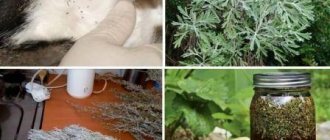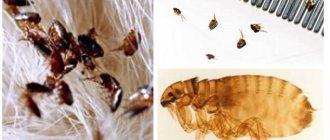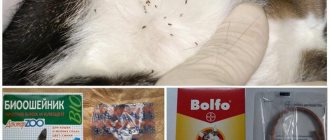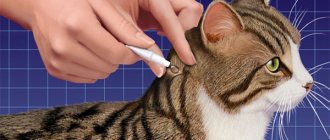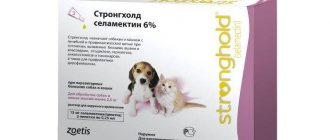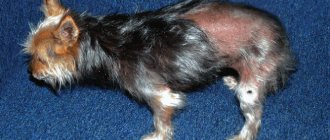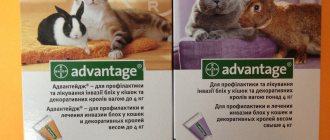Symptoms of the presence of “living creatures”
Fleas, lice, lice and other living creatures are quite frequent guests of pets. And even if the cat has never left the apartment, insects can settle on the animal if they get into the room with the shoes and clothes of household members.
An experienced owner treats the coat against fleas before mating the animal. However, trouble often happens after mating, during the pet’s pregnancy. Signs of parasite infection do not appear immediately. At first, the animal’s behavior is unremarkable, however, as the number of “tenants” increases, the symptoms also increase.
The owner begins to notice that his pet is behaving restlessly: she often bites herself, literally bites into the skin, and becomes nervous due to bites and itchy skin. Most often it itches in the head, abdomen and at the base of the tail. Often, the owner may notice that the cat meows and immediately begins to itch. Upon examination, traces of scratching and crusts of dried blood are visible on the skin. You should know that even a thorough examination of the skin does not always allow visual identification of parasites. But traces of their presence (excrement in the form of dry dark crumbs between the hairs) are not difficult to detect.
If a pregnant cat has fleas, what should you do in this situation? The answer to this question is clear: parasites must be destroyed before birth.
What danger do fleas pose?
Why, if a pregnant cat is infected with ectoparasites, is the issue of combating them so acute? Firstly, fleas cause a lot of problems for your pet: it constantly itches, gets nervous, scratches and other lesions appear on the skin. Secondly, if a mother cat has fleas, they will definitely spread to the kittens. And for children they pose a much greater danger than for adults. Kittens with very delicate skin will experience severe itching and irritation. They will develop poorly, grow weak, anemic and restless. Fleas are also carriers of worms and diseases. To avoid all these troubles, you must initially protect your cat from infection by harmful insects. For example, for preventive purposes, put a flea collar on her.
But there are times when a pet becomes infected with fleas and is a complete surprise to its owners. And then pregnant cats can buy flea drops at a veterinary pharmacy. Even a small drop can cause ectoparasites to actively fall from the animal. Many cat owners prefer these drugs. But not any drops are suitable for pregnant cats, but only those that have a gentle effect. After all, the insecticides contained in the drugs negatively affect the course of pregnancy, causing miscarriages and disturbances in fetal development.
To avoid mistakes when choosing drops, you must consult a veterinarian and use the recommended anti-flea product in strict accordance with the instructions for its use.
Why do fleas need to be removed?
External parasites are more than just a nuisance for your pet. Cat fleas pose a real threat to animal health:
- carry worm eggs;
- contribute to the infection of animals with viral, bacterial and fungal infections;
- lead to allergic dermatitis;
- promote hair loss, baldness;
- lead to infection and inflammation of the affected areas;
- cause anxiety to the animal and increase nervousness;
- cause anemia and emaciation in newborn kittens.
Having discovered parasites in a pet, the owner must immediately take measures to destroy them.
We recommend reading the article about helminthiases (worms) in cats and dogs. From it you will learn about different types of helminths in domestic animals, symptoms of their parasitism, prevention and treatment measures.
Removal methods
Before removing fleas from a pregnant cat, you should familiarize yourself with the list of methods used and assess the seriousness of the situation as a whole. Disinsection methods may vary depending on the condition of the animal, its well-being, and the degree of infection.
Anti-flea collars
The simplest thing you can do if you notice fleas on a pregnant cat is to put a flea collar on her. However, this method is not effective and can be used more as a preventive measure.
The collar has a repellent effect on insects, so it makes sense to put it on the cat when the first fleas appear.
In addition, it can rub the animal's neck and also cause allergic reactions.
Drops
Perhaps experts haven’t come up with anything better than treating a pregnant cat with flea drops. This is a proven product that has already proven its effectiveness. Flea drops destroy parasites and also prevent their reappearance.
This product is quite simple to use - just apply a small amount of insecticide to the withers (where the animal cannot lick them off).
However, in some cases, poisoning fleas with drops is fraught with consequences. An effective insecticide can penetrate the cat’s skin and also be absorbed into its blood, causing intoxication of the body.
In addition, if applied incorrectly, the animal may reach out and lick the drops, which will aggravate its condition.
Since the expected harm from using the drug exceeds the positive effect it has, drops can only be used after consulting a veterinarian.
Insecticides with minimal toxic effects include Advantage-40, Stronghold, and Frontline.
Sprays
Aerosols are also recognized as effective flea repellents. They are easy to apply and quickly kill insects. Sprays are sprayed over the animal's fur, avoiding the eyes, nose, and ears.
However, using them to remove fleas from a pregnant purr is not recommended, since the pet can easily ingest poison. Frontline spray is considered relatively safe for pregnant pets.
Shampoos
This inexpensive, accessible remedy can quickly cope with even severe infestations. Unlike drops and sprays, flea shampoo does not remain on the surface, but is washed off with water. Therefore, the likelihood of animal intoxication is minimized.
You just need to make sure that the pet does not have time to lick itself during the procedure.
Before removing fleas from a nursing or pregnant cat using shampoo, you should make sure that the animal tolerates bathing well.
Otherwise, the pet may suffer a lot of stress, which will cancel out the entire positive effect of the treatment.
Tablets and injections
Before getting rid of fleas using injections and tablets, you should consult your veterinarian as this at-home method is rarely used.
After administration of the drug, a pregnant cat may not experience the best period. An insecticide released in this form is absorbed or enters directly into the animal’s blood and can harm not only the mother, but also the future offspring.
Traditional methods
It is generally accepted that traditional methods of disinfestation have a gentle effect on the animal’s body. Their main disadvantage is low efficiency.
Natural decoctions and infusions have a rather deterrent effect; they are unable to radically solve the problem in case of severe infection.
The following infusions can be prepared at home:
- dry wormwood leaves (20 grams) are poured with 2 glasses of water, boiled for 20 minutes, cooled and lubricated with the resulting product on the skin of the animal.
- Mix eucalyptus, lavender, tansy, and wormwood leaves in equal proportions (10 grams each), add 1 liter of water, boil for 20 minutes, cool and treat the cat with it.
Essential oils have a good repellent effect: eucalyptus, lavender, cedar, rosemary, etc.
They can be applied in the form of an aqueous solution to the cat's fur (concentrated products have a strong smell, causing anxiety for an animal sensitive to aroma). You can mix a few drops of essential oils with shampoo and wash your pet.
Video
Flea and tick medications for pregnant dogs and cats
Treatment for parasites of a pregnant cat
Treating a pregnant cat for fleas is associated with the risk of exposure of her body to toxic substances and insecticides used for these purposes. A pregnant pet is the most sensitive and susceptible to the effects of harmful substances. In addition, some insecticidal preparations can be absorbed into the blood and lead to negative consequences: miscarriages, the birth of non-viable or dead offspring. Therefore, the procedure for removing fleas from a pregnant woman should be approached responsibly, following the following recommendations:
- Before carrying out the procedure, you must consult a veterinary specialist who will advise how to treat a pregnant cat against fleas and help you choose an effective but safe drug;
- the bedding on which the pet sleeps must be boiled or changed;
- before using any form of insecticide (shampoo, drops, etc.), the animal must be thoroughly combed, first with a wide-toothed comb, and then with a fine-toothed one;
- before processing, you should vacuum the furniture, carpets, floor coverings, then throw away the replacement bag or thoroughly rinse the vacuum cleaner container;
- perform the procedure strictly in accordance with the instructions for the drug;
- After treating the animal, it is necessary to disinfect the premises, paying special attention to the hallway, front door, and the pet’s favorite places.
Compliance with the rules for using drugs, preparing the animal, and cleaning the premises will allow you to deal with the problem effectively, quickly and safely.
Review of flea products
Flea remedies
Vet pharmacies have a wide range of effective medications that allow you to remove all kinds of parasites that bother animals. However, many owners of furry creatures are concerned about the question of how to remove fleas from a pregnant cat at home. After all, for such animals it is necessary to select special means that cannot harm either the expectant mother or her offspring. Therefore, ridding the cat of bloodsuckers before the birth of kittens is the main task of every owner of a furry pet. To treat and prevent infection with ectoparasites for pregnant cats, you can use the most gentle and low-toxic means:
- flea collars;
- special disinfectant shampoos for cats;
- flea drops
It is advisable to discuss the choice of the preferred protective and therapeutic drug or accessory with your veterinarian.
Antiparasitic collars
A special plastic tape impregnated with an insecticidal composition is the most popular and simple means of ridding and protecting an animal from ectoparasites. Many owners are trying to find out whether a pregnant cat can wear a flea collar during the entire period of gestation. Veterinarians emphasize that in each individual case the issue of using a particular drug or flea accessory is decided after examining the animal.
Flea collars
Despite this, experts believe that the devices are a safe and effective means of ridding an animal of parasites. This is explained by the fact that medications will not get into the bloodstream or onto the skin of your pet. The most gentle flea treatment for pregnant cats is a biological collar soaked in essential oils that repel bloodsuckers. The most famous representatives of this product line are the Celandine, Doctor Zoo and BioBand straps from the Beaphar, Bars brand. Products marked “bio” contain oils of cinnamon, cloves, bergamot, cedar, lavender and other fragrant plants. Absorbed into the skin and fur, the fragrant composition repels parasites. Despite the complete safety of the impregnation components, you should remember that you should only put a flea collar on a pregnant cat after consulting a doctor.
Review
We were very worried about our cat when they discovered fleas. On the advice of the doctor, I had to put a Celandine bio-collar on her. It’s good that we noticed the insects on time, because after a short period of time there were no parasites on Murka.
Olga, Moscow
Anti-flea shampoos
Specialized pharmacies offer a wide range of insecticidal shampoos that allow you to effectively and safely remove bloodsuckers from your four-legged pets. Detergents are harmless to animals, but dangerous to parasites, as they do not leave them a chance to survive. It is recommended to wash a pregnant cat with flea shampoo only if she is accustomed to bathing and it will not cause her stress.
Lugovoi flea shampoo
Review
We saved our pregnant cat from fleas with Lugovoi shampoo. It is safe and contains herbal ingredients. The doctor recommended it. We started bathing our pet a long time ago, so she is not afraid of these procedures. There are no fleas, and future kittens can be safely fed to their mother, without fear that the babies will become infected.
Victoria, Samara
Preventive actions
To avoid infection, you should minimize contact with other pets (especially in cases where there is a high probability of infection of other animals). Pregnant pets should not be taken outside: there the risk of infection is much higher, especially if there is a stray animal nearby.
Your home should be cleaned regularly. You shouldn’t limit yourself to dry; it’s important to do wet at least once a week.
Anti-flea collars can be used for prevention. It is important to consult a veterinarian first. Regular bathing using special shampoos is also recommended. You will have to bathe not only the pregnant woman herself, but also all other pets (if any). Whether it is possible to bathe a pregnant cat depends on its reaction to water. To make the procedure more comfortable, it is allowed to place an uneven rubber mat on which the paws will not slip.
The animal needs regular thorough examination. If bites are noticed and the first symptoms of parasite infection appear, measures should be taken immediately: the fewer fleas, the easier it is to deal with them.
Sources
- https://apest.ru/blohi/blohi-u-koshek/kapat-kormyaschej-koshke-kapli-ot-bloh/
- https://DrugBarsuk.ru/blohi-u-kormyashhej-koshki/
- https://WikiParazit.ru/blohi/blohi-u-novorozhdennyh-kotyat.html
- https://kot-pes.com/kak-vivesti-bloh-u-koshki/
- https://murashdom.ru/bolezni/kak-vychesat-bloh-u-kotenka.html
- https://nzs-rst.ru/blohi/beremennaya-bloha.html
- https://kotofan.ru/mozhno-li-beremennuju-koshku-obrabatyvat-ot-bloh/
[collapse]
Reviews
Thus, special collars reliably protect the cat from parasites, especially if you choose the right product model and take care of its quality. But we must remember that any, even the most expensive and high-quality collar, impregnated with active substances, can cause an allergic reaction in a cat.
Therefore, it is important to carefully monitor your pet during the first few days of wearing the accessory. Reviews about different models are contradictory: the same collar, no matter whether it’s cheap or expensive, is considered by cat owners to be effective or useless, or even harmful to the animal’s health. Therefore, it is better to choose a collar for your cat through experience.
How to remove fleas from a cat? Simple rules
Along with flea medications, give your pet anthelmintics.
Fleas are often carriers of worms; while getting rid of some parasites, one should not forget about others. Be sure to carry out preventive maintenance once every 3 months for animals that are at home, once every 2 months for those in contact with other cats and those walking on the street. You should not bathe your pet for three days after treatment. It is very important to use products intended only for cats. Before giving tablets or using drops to treat a small kitten or pregnant or nursing cat, consult a veterinarian. Do not let your pet lick itself for half an hour after treating its fur and skin with flea products. Treat not only the animal, but also the places where it is most often found. The main thing is to know that timely assistance to your beloved animal can prevent the occurrence of serious problems that can be caused by cat fleas
It’s a pity that our pets can’t talk, so they could tell us what’s bothering them. Take care of your pet, because we are responsible for those we have tamed. Be sure that he will definitely respond in kind to your attentiveness and love. Health to you and your pets!
The main thing is to know that timely help for your beloved animal can prevent the occurrence of serious problems that can be caused by cat fleas. It’s a pity that our pets can’t talk, so they could tell us what’s bothering them. Take care of your pet, because we are responsible for those we have tamed. Be sure that he will definitely respond in kind to your attentiveness and love. Health to you and your pets!
